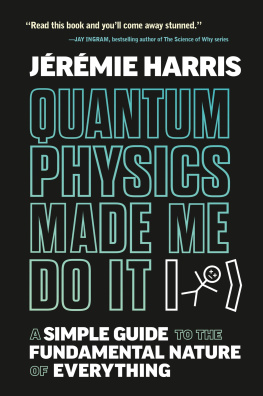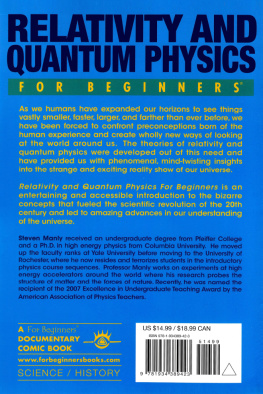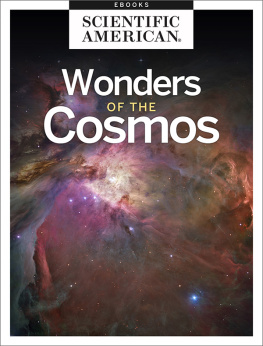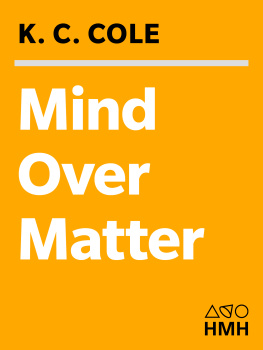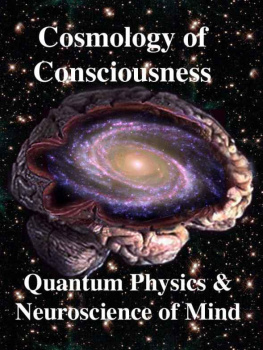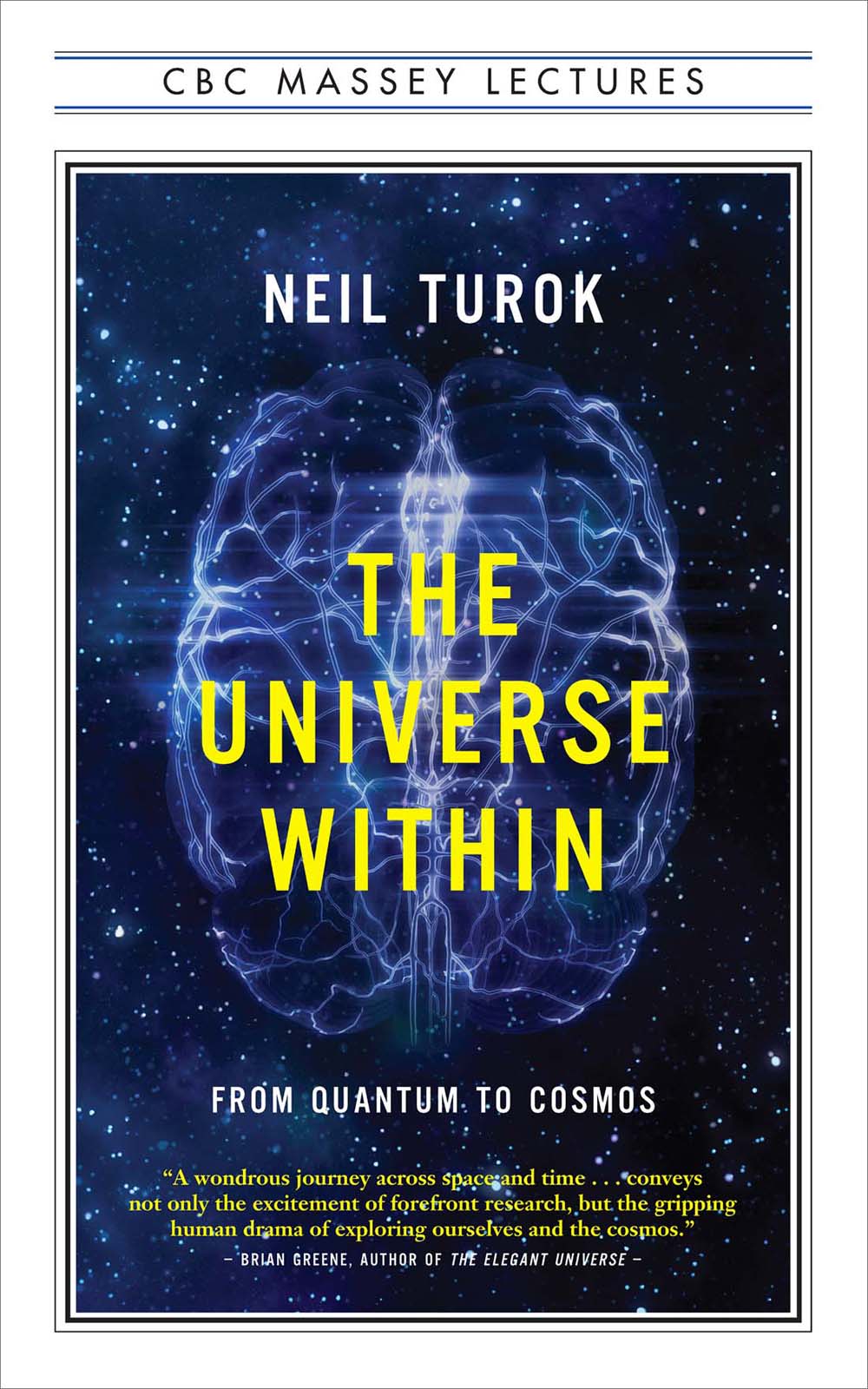THE MASSEY LECTURES SERIES
The Massey Lectures are co-sponsored by CBC Radio, House of Anansi Press, and Massey College in the University of Toronto. The series was created in honour of the Right Honourable Vincent Massey, former Governor General of Canada, and was inaugurated in 1961 to provide a forum on radio where major contemporary thinkers could address important issues of our time.
This book comprises the 2012 Massey Lectures, The Universe Within: From Quantum to Cosmos, broadcast in November 2012 as part of CBC Radios Ideas series. The producer of the series was Philip Coulter; the executive producer was Bernie Lucht.
NEIL TUROK
Neil Turok is one of the worlds leading theoretical physicists and a renowned educational innovator. Director of the Perimeter Institute for Theoretical Physics, he was formerly a professor of physics at Princeton and held a Chair of Mathematical Physics at Cambridge. As well as developing fundamental theories of the cosmos, he has led efforts to determine their predictions and to test them through observation. With Stephen Hawking, he developed the HawkingTurok instanton solutions describing the birth of inflationary universes. With Paul Steinhardt, he developed a cyclic universe scenario, described in their critically acclaimed book Endless Universe: Beyond the Big Bang Rewriting Cosmic History. In 1992, Turok was awarded the James Clerk Maxwell medal of the UK Institute of Physics and, in 2008, a prestigious TED Prize. Born in South Africa, Turok founded the African Institute for Mathematical Sciences ( AIMS ), a pan-African network of centres for education and research. This work has been recognized by awards from the World Summit on Innovation and Entrepreneurship ( WSIE ) and the World Innovation Summit on Education ( WISE ). Turok lives in Waterloo, Ontario, Canada.
ALSO BY NEIL TUROK
Endless Universe: Beyond the Big Bang
Rewriting Cosmic History (with Paul J. Steinhardt)
THE UNIVERSE WITHIN
From Quantum to Cosmos
NEIL TUROK
Copyright 2012 Neil Turok and Canadian Broadcasting Corporation
All rights reserved. No part of this publication may be reproduced or transmitted in any form or by any means, electronic or mechanical, including photocopying, recording, or any information storage and retrieval system, without permission in writing from the publisher.
Distribution of this electronic edition via the Internet or any other means without the permission of the publisher is illegal. Please do not participate in electronic piracy of copyrighted material; purchase only authorized electronic editions. We appreciate your support of the authors rights.
This edition published in 2012 by
House of Anansi Press Inc.
110 Spadina Avenue, Suite 801
Toronto, ON, M5V 2K4
Tel. 416-363-4343
Fax 416-363-1017
www.houseofanansi.com
Library and Archives Canada Cataloguing in Publication
Turok, Neil
The universe within : from quantum to cosmos / Neil Turok.
(CBC Massey lecture series)
Includes bibliographical references and index.
ISBN: 978-1-77089-225-5
1. CosmologyPopular works. 2. Discoveries in science.
3. ResearchSocial aspects. I. Title. II. Series: CBC Massey
lecture series
QB982.T87 2012 523.1 C2012-902895-9
Library of Congress Control Number: 2012938339
ISBN: 978-1-77089-017-6 (US)
Cover design: Bill Douglas
Ccover images: (Brain) science picture co/science faction/Getty; (Universe) clearviewimages/iStockphoto
We acknowledge for their financial support of our publishing program
the Canada Council for the Arts, the Ontario Arts Council, and the Government of Canada through the Canada Book Fund.
To my parents
AUTHORS NOTE
IN THIS BOOK, I try to connect our progress towards discovering the physical basis of reality with our own character as human beings.
This is not an academic text. I describe some of physics biggest ideas and how they were discovered, but I make no serious attempt to provide a balanced history or to properly apportion credit. Instead, I use my personal experience as a common thread, along with accounts of people, times, and places that seem special to me. The personalities are interesting, but I use them mainly as illustrations of what is possible and of how much more capable we are than we realize. I am not a philosopher, historian, or an art or literary critic, but I draw on each of these subjects to illustrate the circumstances and the consequences of our deepening knowledge. This is a vast subject, and I apologize for my limited perspective and for my many arbitrary choices.
My goal is to celebrate our ability to understand the universe, to recognize it as something that can draw us together, and to contemplate what it might mean for our future.
I have benefitted from the insights and mentorship of wonderful colleagues, too numerous to mention. I have been equally inspired by many non-scientists, people who through their lives exemplify what it means to be human. Our science and our humanity are two sides of the same coin. Together, they are the means for us to live up to the opportunity of our existence.
ONE
MAGIC THAT WORKS
Happy is the man who can recognize in the work of today a connected portion of the work of life,
and an embodiment of the work of Eternity.
James Clerk Maxwell1
WHEN I WAS THREE years old, my father was jailed for resisting the apartheid regime in South Africa. Shortly afterward, my mother was also jailed, for six months. During that time, I stayed with my grandmother, who was a Christian Scientist. My parents werent religious, so this was a whole new world to me. I enjoyed the singing, and especially the Bible: I loved the idea of a book that held the answer to everything. But I didnt want a big Bible; I wanted a little Bible that I could carry around in my pocket.
So I campaigned endlessly for my grandmother to buy me the smallest possible Bible. When she finally did, I took it everywhere. I couldnt read yet, but that didnt matter to me. What I most wanted, even at that early age, was to capture and hold the truth, with the certainty and love that it brings.
My father was charged with sabotage and was fortunate to be released after only three and a half years. Others who had been tried on lesser charges were given life terms. On my fathers release from prison, he was held under house arrest but escaped and fled north to East Africa. We followed him there and lived in Tanzania for several years before moving to London, England. There we joined a small community of exiles trying to survive in unfamiliar, damp, and gloomy surroundings. Nevertheless, my parents always held firm to their ideas. One day, they told my brothers and me, there will be a great change, and South Africa will be free.
It was hard for us to believe them. Throughout the 1970s and 1980s, as I was growing up in England, going to high school and then university, the situation back home seemed hopeless. The apartheid regime was popular with the all-white electorate, and it had powerful allies overseas. South Africa even developed and tested nuclear weapons. The tiny handful of organized dissidents were easily captured and imprisoned. Protests by school students in Soweto were ruthlessly crushed, and the police state took an iron grip.


